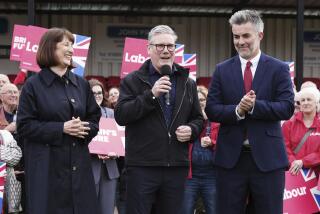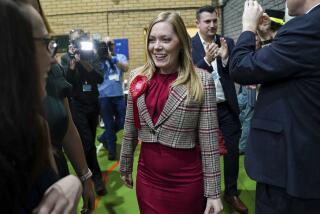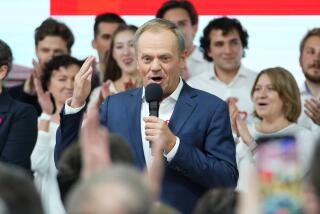He Sees Returns as Support for Tough Policies : Shamir Revels in Likud Election Gains
- Share via
JERUSALEM — Prime Minister Yitzhak Shamir gloried Wednesday in the surge of his Likud Party in municipal elections, calling it a show of support for his stand on Middle East peace talks and tough handling of the Arab uprising, while the dovish Labor Party pondered how to reverse a steady decline in its fortunes.
Likud won six of 10 major city hall races in Tuesday’s nationwide vote, prying several Labor mayors away from power for the first time.
Shamir had billed the races as a referendum on his stand against talking to the Palestine Liberation Organization and against holding an international conference to settle the Middle East conflict. As the returns went his way, the feisty prime minister seized the opportunity to make points at home and abroad.
“There is no doubt that the elections that took place yesterday proved that the Likud is getting stronger, and together with it naturally, the majority which sides with its diplomatic positions,” Shamir said on a radio broadcast.
“The results certainly strengthen me, and the headlines of the Israeli papers have already reached the world media and the United States, and nobody can tell me I speak in the name of a small part of the Israeli public.”
Deputy Foreign Minister Binyamin Netanyahu added that the triumphant results were “a message to the world.”
Shamir’s top assistant Yossi Ben-Aharon used the results to discount recent polls that show a majority of Israelis favoring talks with the PLO. “Even those who say they are for talks with the PLO, there is a good body among them who are against a Palestinian state and against the PLO as a terrorist movement,” Ben-Aharon asserted.
Open to Questions
Likud’s interpretation of the results is open to question. In Jerusalem, for instance, the party ran a poor third behind a ticket headed by longtime mayor Teddy Kollek and a group of religious parties.
Jerusalem is the Israeli city perhaps most directly affected by the Arab uprising, which began nearly 15 months ago. The capital sits on the edge of the rebellious West Bank, and violence linked to the uprising occasionally breaks out in its Arab neighborhoods. Its Arab merchants routinely close shops in response to dictates of the revolt’s leadership.
In Tel Aviv, Israel’s largest city, the Likud incumbent mayor held firmly to power. But the mayor, Shlomo Lahad, favors trading land in the occupied West Bank and Gaza Strip for peace treaties with Israel’s neighbors. Shamir opposes such proposals.
Nationwide, the turnout was low, about 48%, compared to 55% in municipal elections held in 1983. Last fall, more than 75% of eligible voters turned out for parliamentary elections in which peace was a major issue. Likud narrowly edged Labor to win a plurality of seats.
Shamir has been trying to build an impression of unity among Israelis and worldwide Jewry before a trip to Washington in April.
In any case, the results clearly show Likud’s maturity as a political force. Despite its dominance of national parliamentary elections in recent years, Likud has been perceived as weak in local races.
All that has changed. The nationalistic party wrested control from Labor in at least four important cities--Beersheba, Ashdod, Petah Tikva and Ramat Gan. It fell just short of winning in Haifa, a legendary stronghold for center-left Labor.
“The Likud has now in effect become the dominant party in the country. It has finally translated its gains in national politics to the municipal scene,” political scientist Hanan Crystal said on government radio.
“Likud worked very hard in these elections. It reflects their eagerness to overcome a lingering underdog status,” said Shaul Ramati, a former Israeli diplomat.
Leaders of Labor, meanwhile, surveyed the erosion of their last bastion of strength at the grass roots. Party leader Shimon Peres admitted in a radio interview that Labor “has definitely been dealt a blow, and I don’t want to underestimate its force.”
The results may mean trouble for Peres’ continued leadership of the party. He has failed to take Labor to victory in any of the past four parliamentary elections; Labor participates in the current coalition government as a junior partner to Likud and has agreed to operate with Shamir in the prime minister’s post for four years.
Some political analysts said the vote indicated irritation among many Labor members because of Peres’ agreement to join the Likud-led coalition.
ISRAEL ELECTIONS JERUSALEM: Pro-Labor Mayor Teddy Kollek was reelected to a sixth term but failed to win a majority in the City Council; religious parties doubled their representation.
WINNERS: Ultra-Orthodox Jewish parties scored gains in nationwide municipal elections; Muslim fundamentalists did well in Israeli Arab areas; the Likud Party won in several Labor Party strongholds.
LOSERS: The Labor Party, which argued that the election concerned local, not national policy issues.
More to Read
Sign up for Essential California
The most important California stories and recommendations in your inbox every morning.
You may occasionally receive promotional content from the Los Angeles Times.











